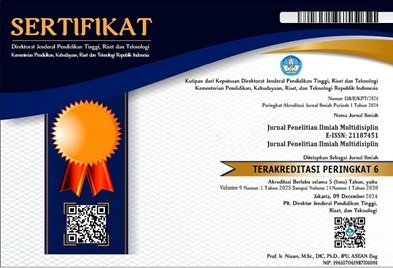PENGARUH MODEL PEMBELAJARAN KOOPERATIF (COOPERATIVE LEARNING) TIPE MAKE A MATCH (MENCARI PASANGAN) TERHADAP HASIL BELAJAR SISWA DALAM PEMBELAJARAN IPS SMP NEGERI 8 TENGGARONG
Kata Kunci:
Make A Match, Hasil Belajar, Pembelajaran IPS, SMP Negeri 8 TenggarongAbstrak
Model pembelajaran Make a Match adalah salah satu pendekatan kooperatif yang dirancang untuk meningkatkan efektivitas proses belajar-mengajar serta hasil akademik peserta didik. Metode ini mendorong keaktifan siswa dengan cara mencocokkan kartu yang berisi pertanyaan dengan kartu yang memuat jawaban relevan, berdasarkan topik yang telah dipelajari sebelumnya. Penelitian ini bertujuan untuk mengeksplorasi sejauh mana penerapan model Make a Match dapat berkontribusi terhadap hasil belajar siswa dalam mata pelajaran Ilmu Pengetahuan Sosial (IPS). Penelitian ini menggunakan pendekatan kuantitatif dengan metode eksperimen yang menerapkan desain Posttest Only Control Group. Sampel penelitian terdiri dari 53 siswa yang dibagi menjadi dua kelompok: kelas IX A sebagai kelompok perlakuan dan kelas IX B sebagai kelompok kontrol. Data dikumpulkan melalui tes hasil belajar, angket, dan dokumentasi. Tahapan analisis data mencakup analisis statistik deskriptif, pengujian normalitas, linearitas, homogenitas, serta pengujian hipotesis menggunakan teknik regresi linear sederhana. Hasil penelitian menunjukkan bahwa model Make a Match memiliki pengaruh signifikan terhadap peningkatan hasil belajar siswa. Hal ini dibuktikan dengan nilai signifikansi sebesar 0,000, yang lebih kecil dari tingkat signifikansi 0,05 (0,000 < 0,05). Dengan demikian, dapat disimpulkan bahwa terdapat pengaruh signifikan antara penerapan model Make a Match (variabel X) terhadap hasil belajar siswa (variabel Y). Selain itu, nilai koefisien determinasi (R²) sebesar 0,634 menunjukkan bahwa 63,4% variasi dalam hasil belajar siswa dapat dijelaskan oleh penggunaan model ini, sementara sisanya dipengaruhi oleh faktor lain di luar penelitian.
The Make a Match learning model is one of the cooperative approaches designed to improve the effectiveness of the teaching-learning process and the academic results of students. This method encourages student activity by matching cards containing questions with cards containing relevant answers, based on previously studied topics. This study aims to explore the extent to which the application of the Make a Match model can contribute to student learning outcomes in Social Science (IPS) subjects. This study uses a quantitative approach with an experimental method that applies the Posttest Only Control Group design. The research sample consisted of 53 students divided into two groups: class IX A as the treatment group and class IX B as the control group. Data were collected through learning outcomes tests, questionnaires, and documentation. The data analysis stages include descriptive statistical analysis, normality, linearity, homogeneity testing, as well as hypothesis testing using simple linear regression techniques. The results of the study indicate that the Make a Match model has a significant influence on improving student learning outcomes. This is evidenced by a significance value of 0.000, which is smaller than the significance level of 0.05 (0.000 < 0.05). Thus, it can be concluded that there is a significant influence between the application of the Make a Match model (variable X) on student learning outcomes (variable Y). In addition, the coefficient of determination (R²) of 0.634 indicates that 63.4% of the variation in student learning outcomes can be explained by the use of this model, while the rest is influenced by other factors outside the research.





